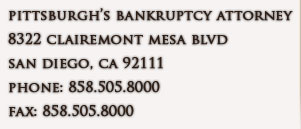
- Bankruptcy
- Bankruptcy During Divorce
- Business Bankruptcy
- Chapter 11 Bankruptcy
- Chapter 13 Bankruptcy
- Chapter 7 Bankruptcy
- Credit Card Debt Relief
- Credit Counseling
- Credit Repair
- Debt Collection Harassment
- Debt Consolidation
- Debt Relief Options
- Discharging Student Loans
- Home Foreclosure
- How Bankruptcy Filing Works
- Medical Bankruptcy
- New Bankruptcy Laws
- Personal Bankruptcy
- Should You Declare Bankruptcy
- Wage Garnishment



How bankruptcy filing works
Bankruptcy is a legal process that officially declares a debtor unable to pay back their creditors. There are six different forms of bankruptcy called chapters that can be adapted to the needs of different filers. An individual or a business can file for bankruptcy.
The Pittsburgh Bankruptcy Attorney can assist any client file for any of the six available options such as a Chapter 7 bankruptcy, a Chapter 11 bankruptcy, or a Chapter 13 bankruptcy.
Chapter 7 filings are the most common form of bankruptcy. A Chapter 7 filing is a basic liquidation of a person or business’ assets. A trustee will be appointed by the court to review the petitioner’s finances and decide how creditors will be paid back. This may mean that a trustee decides to sell a petitioner’s home or a business’ machinery and office building in order to pay back creditors. Any excess of funds from the sale of the assets left over from the payment of creditors will be returned to the filer. There are certain asset exemptions for individuals such as a portion of their home’s equity, vehicles under a certain value, and child support payments.
In addition to bankruptcy help, the Pittsburgh Bankruptcy Attorney also offers services involving credit card debt relief, bankruptcy during divorce, credit counseling, credit repair, home foreclosure services, discharging student loans, and much more.
Not every form of bankruptcy involves a complete seizure of assets; however it is still important to retain an experienced bankruptcy attorney to insure that your assets are protected and you are treated fairly by the court. By appointing the Pittsburgh Bankruptcy Attorney, you are guaranteeing your family or your business the best bankruptcy deal possible for your case. Contact us today for a free initial consultation with the Pittsburgh Bankruptcy Attorney.